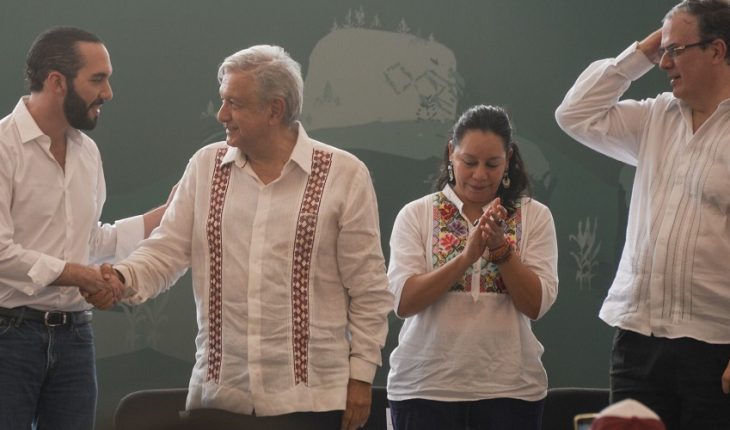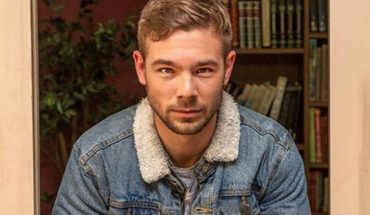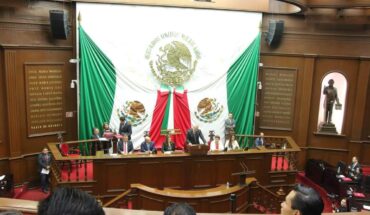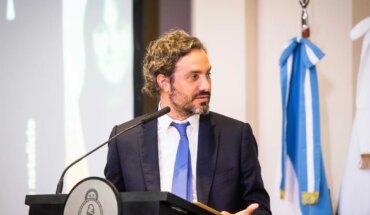The Fondo México trust, in charge of managing the 30 million pesos to Central America to implement social programs, will be extinguished without Honduras and El Salvador receiving a peso.
The money is in the Welfare Bank, according to the Ministry of Foreign Affairs (SRE), which ensures that the plans, suspended because of COVID-19, are not in danger. For the time being, support is limited to a broken promise. Chancellor Marcelo Ebrard assured in August 2019 that by March of this year “Sembrando Vida” and “Young Building the Future” would be operating in the two Central American countries. A first evaluation was scheduled to take place at the time. The pandemic arrived, the whole process was paralyzed, but no one had even been defined to measure the results.
The Mexico Fund is as known in this six-day Yucatan Fund, an investment plan for Central America and the Caribbean dating back to 2011, when it was launched by then-President Felipe Calderón. This is where Mexico’s 30 million have promised Honduras and El Salvador to launch social programs to try to curb irregular migration to the United States. The fund, as confirmed by the SRE, will disappear by the “Decree ordering the termination or termination of public trusts, public mandates and similars”, published on 2 April 2020 in the Official Journal of the Federation (DOF).
“This termination does not imply the cancellation of the commitment made by Mexico for the implementation of the programs referred to in Honduras and El Salvador, since in accordance with the operating rules, the channeling agreement and the respective donation contracts of the Trust the resources are concentrated in Banco del Bienestar S.N.C., I.B.D., as a financial intermediary , and they will be dispersed as soon as the optimal conditions exist, in accordance with the nature and guidelines that each programme establishes for this purpose,” the SRE said.
The Mexico Fund’s sunset order dictates that its resources be returned to the Federation Treasury, according to an order signed by the Secretary of the Treasury, Arturo Herrera Gutiérrez, to which he had access Political Animal.
Work to implement “Young Building the Future” and “Sembrando Vida” in Honduras and El Salvador have been paralyzed since March because of the PANdemic for COVID-19. However, the deadlines stipulated a year ago have not been met, when López Obrador signed the agreements with his counterparts Nayib Bukele and Juan Orlando Hernández. The chancellor, Marcelo Ebrard, then assured that by March social programs would have been deployed in both Central American countries and that 20,000 jobs were planned to be created in each of them.
At the time of his suspension, only one-sixth of the announced registrations had been reached. The Mexican Agency for Cooperation and Development (Amexcid), responsible for the management of the programs, recognized that there are 8 thousand people in the process, without specifying how many correspond to each country. This is the same figure as its headline, Laura Elena Carrillo Cuevas, said in March that they had registered in El Salvador. In any case, it is a number far removed from the 40 thousand records that Chancellor Ebrard predicted in August, when he publicly presented the initiative at the morning conference.
According to Ebrard, the programmes were scheduled to be in operation in March and a first joint evaluation would be carried out with the Governments of El Salvador and Honduras. However, Amexcid recognizes that mechanisms for tabling institutional work have not yet been developed. “Consultations are underway with various evaluating agencies to establish the necessary mechanisms to carry out assessments of the Building Life and Young Building the Future initiatives applied outside the national territory,” the agency said in a response to a request for public information.
Since the programs were announced, the director of Amexcid, Laura Elena Carrillo Cubillas, has traveled ten times to Honduras, El Salvador and Guatemala. These official trips were recorded in the reports of official commissions to which you agreed Political Animal after requesting access to the information.
The first meetings took place between July 7 and 11 in Tegucigalpa, Honduras, and San Salvador, El Salvador. In those early contact, Mexican officials explained the operation of the program. In El Salvador began the joint work of the technical team while, in Honduras, they also worked on the visit that Juan OrLando Hernández made Mexico at the end of the month.
Between July 16 and 20, a Mexican delegation led by Marcelo Ebrard returned to San Salvador. There was an event in which the “first 200 Salvadorans” participating in “Sembrando Vida” was convened and packages of agricultural inputs were delivered. The report does not specify where the funds came from to pay for these inputs or how much was disbursed, but they are not part of the 30 mdd aid package, as it remains intact at the Welfare Bank.
To kick-start the program, Chancellor Ebrard participated in a tree planting with President Nayib Bukele. At that time there was a great harmony between the two executives. However, the relationship has deteriorated to the point of casting serious mutual reproaches after Bukele uninsoly accused the Mexican government of failing to control flights to his country and allowing infected COVID-19 passengers to climb.
Travel records show the different rhythms at which work was worked in the three countries of the Northern Triangle of Central America. In El Salvador, by 1 October the contract for donations had already been signed, while in Honduras the first registrations were not made until mid-February, when an event took place in Comayagua, a municipality located almost 100 kilometers northwest of Tegucigalpa, the capital. In Guatemala the process is going even slower. In August, Alejandro Giammattei prevailed in the second round of the elections and it was until December that some of the officials who were going to hold relevant posts in his cabinet, such as Chancellor Pedro Brolo, met with a Mexican delegation.
Soon after, the pandemic arrived and the governments of Honduras, El Salvador and Guatemala closed their borders. In addition, the first two asked Mexico to temporarily suspend the implementation work of Sembrando Vida y Jóveness Building the Future. The SRE said in another response that “only recently are they in the process of being revived,” without giving further details.
The development funds agreed with the Central American countries originate from various initiatives. The SRE states that the idea began with the Political Declaration signed on December 1, 2018 in Mexico City between representatives of Honduras, Guatemala and El Salvador with President López Obrador, who that day premiered in office. At the time, thousands of Central Americans who had traversed the country by caravan remained stranded in Tijuana waiting for an opportunity to cross into the United States. From this came the Integral Development Plan for El Salvador, Guatemala, Honduras and Mexico which was presented by the Economic Commission for Latin America and the Caribbean (ECLAC) on May 20, 2019.
On June 7, Marcelo Ebrard signed an agreement with Donald Trump’s government in Washington that commits to preventing the transit of migrants from Central America in exchange for the United States not imposing tariffs on exports. As a result of this pact, Mexico will militarize the borders (6,000 national guard members were sent south). In addition, it will allow Asylum Seekers in the United States to be returned to their territory to await their legal process there. Since then, more than 60,000 people fleeing violence have been returned to cities with high homicide rates such as Tijuana, Baja California; Juarez, Chihuahua; o Matamoros, Tamaulipas.
Two weeks later the agreements with Honduras and El Salvador are signed by which Mexico commits to deliver 30 mdp to each country to implement “Sembrando Vida” and “Young Building the Future”.
“Subsequently, several donation contracts were concluded between Banco Nacional de Comercio Exterior, S.N.C., I.B.D. (BANCOMEXT) as Trustee of the Mexico Fund; The Mexican Agency for International Development Cooperation (AMEXCID), as the unit responsible for the Trust; Banco del Bienestar, S.N.C., I.B.D. as a financial intermediary; as well as the respective representative of each country as a donor,” the SRE said.
“For the government led by President Andrés Manuel López Obrador, it is prevailing to end corruption and with intermediaries who only seek benefit typical of the application of social programs. In this sense, the mechanism implemented through the implementation of the Mexico Fund, aims to make it the beneficiaries of “Sembrando Vida” and “Young Building the Future”, who receive the resources directly”, he explained.
The Mexico Fund will be extinguished according to the decree of April 2. However, the money is in the Welfare Bank and, according to the SRE, will be available when the programs are reactivated.
In 2019, first year with Lopez O186,750 foreigners were arrested in the government, of which 157 thousand 691 were Central American. Of these, 120 thousand 549 were deported to their countries, most of them to Honduras, El Salvador and Guatemala.
The trend at the beginning of 2020 was upwards, with 11 thousand 996 Central Americans arrested in January alone, of which 8 thousand 239 were returned. However, the emergence of the pandemic has also been a near-absolute brake on the flow of migrants into the United States. In May, only 1 thousand 864 Central Americans were arrested, of which 1 thousand 098 were returned.
What we do in Animal Político requires professional journalists, teamwork, dialogue with readers and something very important: independence. You can help us keep going. Be part of the team.
Subscribe to Animal Politics, receive benefits and support free journalism #YoSoyAnimal.
translated from Spanish: Government extinguishes Mexico Central America Aid Fund
July 22, 2020 |





